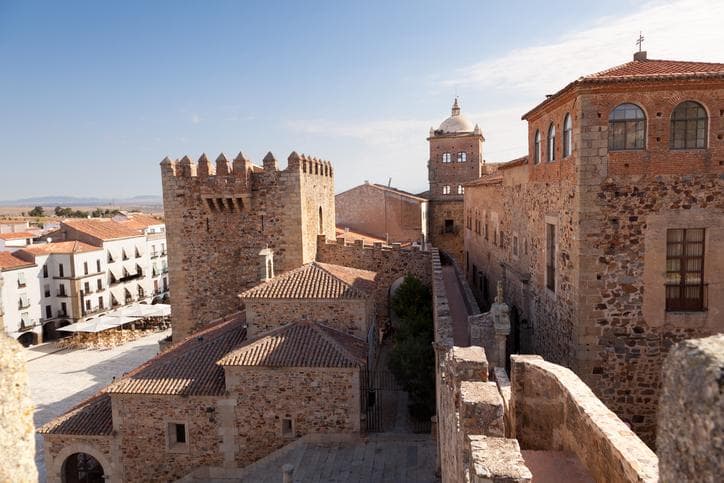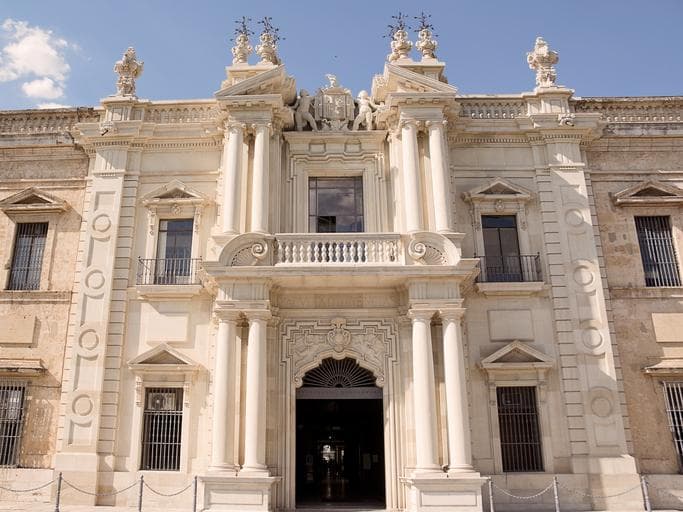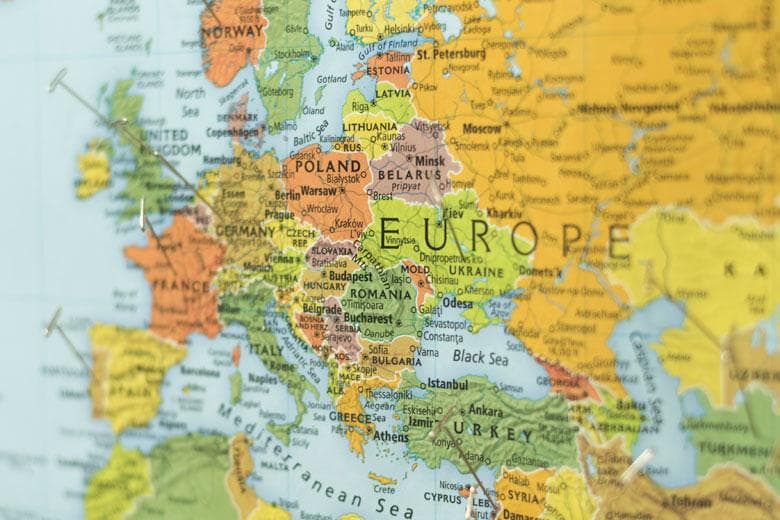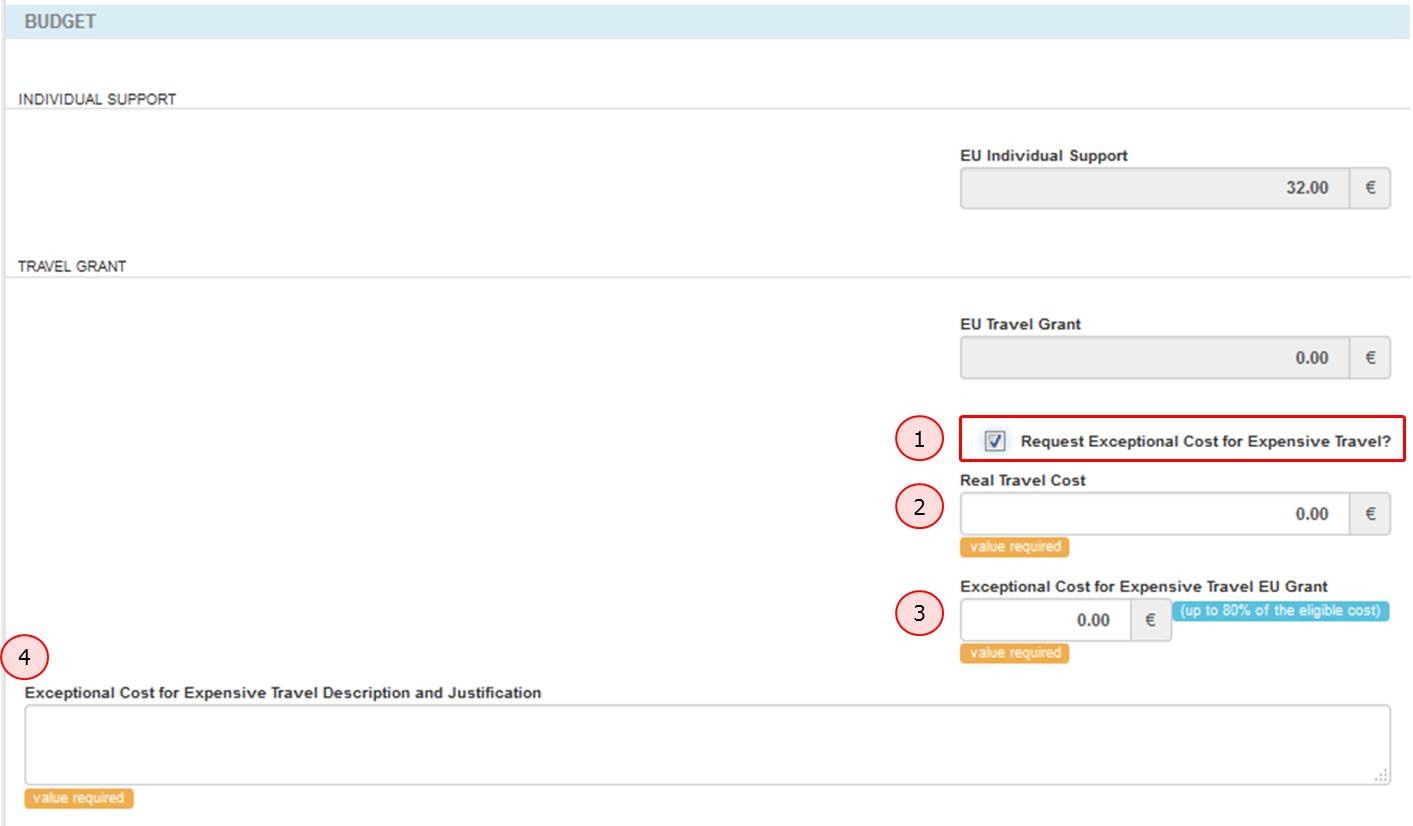Calculate unit costs for eligible travel costs
Commission Decision C(2021)35 , as amended by Commission Decision C(2023)4928, authorises the use of unit costs for the reimbursement of eligible travel costs awarded under any action or programme financed by the Union budget under the 2021-2027 MFF period. This page provides two calculators to allow the granting authority calculate the relevant distance for identifying the correct unit cost under point 5.1 of the Decision (Amounts for return air, rail and combined air/rail journey).
The unit cost to be paid depends on the distance between the place of departure and place of arrival. The two calculators below can be used to calculate this distance. The appropriate unit cost for a return trip will be determined by comparing the distance from the calculator to the distance bands listed in table 1 and table 2 below. The table to be used will depend on the date of opening of the relevant call and the end date of the project (see explanations under table 1 and table 2 below).

Rail calculator
For rail travel of more than 400km:
Flight calculator
For flights of more than 400 km:
Table 1: Unit cost per distance band (reference Commission Decision C(2021)35)
for calls with an opening date before 26/07/2023 and for projects with end date on 31/12/2022 or before, or ongoing on 01/01/2023 and where the beneficiary has voluntarily opted not to use the increased amounts listed in table 2.
Table 2: Unit cost per distance band (reference Commission Decision C(2023)4928)
for all calls with opening date as of 26/07/2023, and for projects ongoing on 01/01/2023 or with start date after that and where the beneficiary has voluntarily decided to use the amounts increased from those published in the original call and listed in table 1.
Share this page
Going on Erasmus is a once-in-a-lifetime experience! Being fully independent, travelling, partying, making new friends from all over the world. However, all these things also bring a financial burden to them. Keeping an eye on your financial situation is important before and during your Erasmus since you do not want to find yourself in a situation where it starts to be difficult to make ends meet every month. Having financial problems can really take the fun away from your Erasmus, and you might not even be able to join in on all the trips everyone has planned anymore. To not let this happen to you, we have gathered some information to help you with your costs during Erasmus.
Read more about:
- The complete Erasmus guide
- Eurosender discounted shipping
Living costs on Erasmus
How much you will spend every month heavily depends on what city and country you will live in. Living costs in Eastern Europe are quite low when compared to the price of rooms in London. Do a bit of research about the prices of rent, food and transport in your Erasmus city. This will give you a better image of what to expect will be your fixed expenses every month . Not really sure yet which country to choose?
Create a daily or weekly budget
Once you arrive in your new city, it is a good idea to take notes on how much you are spending on everything every week. Once you know this, you will be able to set a budget for yourself and try to stick to that. That way you know that you will not be overspending and be completely out of money during the middle of the month.
Start saving
Probably one of the best tips we can give you to prevent potential problems with costs during your Erasmus: start saving now . Try to set some money aside every month specifically with the intention of using it during your Erasmus. This will help you with the first expenses, like accommodation, fees, etc. Do not have that much money left every month? Try to get a job! Just sign up for a student job/internship or a part-time job. You will not be the first one to do so and later you will be happy that you did.
Discount cards
One of the great advantages of being an Erasmus is that you can get discounts for almost anything . Flight tickets, accommodation, restaurants, you name it. With all these discounts you could cut back quite a lot on your expenses for travelling and other activities. Some of the major student discount cards are the International Student Identity Card (ISIC) and the ESN Card . Both offer a lot of benefits and discounts for adventures all over Europe!
Erasmus+ Grant
Of course, you are not completely on your own. When you are from a country within the European Union and you do your exchange in one of the partaking Erasmus countries, you will also receive the Erasmus+ Grant. This is a certain amount of money you receive every month to help you a little with all your costs. The amount of money depends on the country you are living in since you will need more money to live in the Netherlands than, for example, you do in Bulgaria. Erasmus+ has divided all the Erasmus countries into 3 groups (high, medium and low living costs). Below you will find the currently allocated grants.
Grants for studying abroad
Grants for working abroad.
Source retrieved from https://www.erasmusplus.org.uk/higher-education-student-and-staff-grant-rate Disclaimer: This information is applicable to students from the United Kingdom, and it is meant solely as an example. Your grant could be higher or lower depending on what country you are from. Extra financial help might be applied from your sending institution and/or government and receiving institution.
Although getting some extra money for your exchange helps a lot in covering your expenses, keep in mind that your Erasmus Grant will not cover all your costs and things might be more expensive than you first thought. Maybe your flight tickets are pricier than you thought they would be or unexpected things such as a hospital visit could happen. Normally you should be able to cover 50% to 80% of your costs with your Erasmus Grant, but this is still not guaranteed.
The reality is that living abroad is more expensive than just living in your home country where everything is familiar. Especially in the first few weeks, it will be difficult to know where the cheaper places to eat and to shop are. Not to mention all the costs for parties, travelling, souvenirs and other fun things. Making sure that you have enough money saved before your adventure starts, will be something you will thank yourself for later. Erasmus should be a time where you are free and independent and not constantly have to think about whether you will be able to afford everything.
Still got questions? Need to send your luggage to your Erasmus destination? Contact us! We are here to help.
You need to enable JavaScript to run this app.
What is the Erasmus+ scheme?
Have you ever wanted to study abroad do you live in the eu you might want to have a look at the erasmus programme for its study abroad exchanges, grace mccabe, .css-76pyzs{margin-right:0.25rem;} ,, alexandra alexandrova.
If you live in the European Union (or one of a few other countries outside the EU), you may be able to take part in the Erasmus exchange programme, which is designed for university students in the EU and partner countries to study abroad. Here we look at what the Erasmus+ programme can offer, explain how to apply to it and hear directly from a student who took part in Erasmus.
What is the Erasmus+ programme?
Erasmus is a student exchange programme for citizens of the EU and partner countries. There have been several versions of the Erasmus programme as it has grown over the years, but the main aim has always been to provide students with the opportunity to experience education abroad.

Dream global, study global: get involved today
The current version is called the Erasmus+ programme. This combines the previous aspects of the scheme with further funding for staff training, work experience, vocational training and adult education abroad.
When did the Erasmus programme begin?
The Erasmus exchange programme was set up in 1987, and the Erasmus+ programme began in 2014. The scheme was named after the famous Dutch philosopher and theologian Desiderius Erasmus of Rotterdam, but the original idea of promoting cultural, social and educational exchange between students in Europe was down to Sofia Corradi in 1969, who was affectionately nicknamed “Mamma Erasmus”.
More than 9 million students have taken part in the Erasmus student exchange programme since its launch, and it now accepts about 300,000 participants each year.
Which countries are involved in Erasmus+?
There are approximately 30 countries involved in Erasmus+. Some of the most popular destinations for students are Spain, Italy, France, Sweden, Germany and the Netherlands. Other participating countries include Hungary, Cyprus, Croatia, Malta, Romania, Norway and Slovakia.
It is important to choose your destination with care because you will not only have the chance to study and work there, but you will also be able to explore and learn all about the local culture.
How do you apply to Erasmus+?
The Erasmus+ programme is usually organised between universities or colleges through partnerships they have formed with each other. Each university will explain how you can apply for Erasmus+ through its Erasmus coordinator.
The usual steps are:
- Complete a student application form, including a personal statement about why you want to study abroad and how it will help your education.
- Complete a grant agreement.
- Complete a risk assessment.
- Complete a learning agreement.
Each stage needs to be signed off and supported by the faculty Erasmus coordinator, and applications will be sent in the January of the first year that you wish to go abroad.
Once the application process is complete, Erasmus+ will interview candidates in February, when all applications are closed. If you are successful, you will be nominated to the linked university. You can then complete the final stage of the process by applying directly to the institution.
Five things you hadn’t thought to prepare for as an international student How joining a society helped me settle in as an international student The best ways to prepare for studying abroad
How do grants and tuition fees for Erasmus+ work?
Students who join the Erasmus scheme do not have to pay any university fees for their host university. However, you will still have to pay fees for your own university. Some students can receive help with reduced fees when studying abroad, but it is best to find out this information directly from your own university.
Students who are eligible will receive the Erasmus+ grant, which will go towards other study or working abroad costs. If you receive any student grants or loans, you often will continue to receive these even during your year abroad.
Erasmus+ also offers a student grant for students with special needs who wish to take part in the programme and might not be able to participate without other financial support. This entails more forms and requirements, which your faculty coordinator will be able to advise on.
Finally, students can apply for a travel grant when taking part in Erasmus+. If successful, you may receive aid towards travel costs for at least half the academic term.
Why apply to Erasmus+?
There are many benefits of the Erasmus Student Exchange Programme:
- Travel – see the world and explore different cultures
- Meet people – make new friends and contacts who will be part of your life forever
- International education – experience new teaching and learning styles
- Independence – learn how to manage your life and set priorities for yourself
- Learn a new language – communicate with people in their own language and develop your skills beyond tourist level, or practise your English with other non-native speakers
- Build your employability – enhance your CV with experiences that many employers will find interesting and make yourself a valuable candidate
Student experience: Alexandra Alexandrova
I am Alexandra Alexandrova, and I would like to share with you my experience of moving abroad to Barcelona through the Erasmus programme.
Planning a study period abroad is a big dose of excitement with a juicy dash of challenges that go with it inevitably.
My journey abroad began in 2017, when I started my studies in the Netherlands, having moved to study there from Bulgaria. In 2019, I had the amazing opportunity to move again to study in Barcelona through the Erasmus programme. So yes, I would be an international student, going abroad from my already-abroad experience – a bit confusing.
To be fully transparent, my home university arranged most of the practicalities for the exchange semester. Early on in our second year, we had lecturers telling us all about opportunities to go on exchanges with and without Erasmus. If we chose to take part in the exchange, our university provided us with a step-by-step guide that informed us about the deadlines we had to keep in mind when submitting the documents and making contact with the partner university.
However, such ready help may not always be available as some institutions do not actively promote exchange programmes. It may be down to you to seek out the student exchange office and prepare a schedule so you do not miss any deadlines. For example, the Erasmus grant application is usually around June/July – a few months before the start of the trip. If you miss it, you might miss out on the grant, too – so start early. While the grant will not cover all your costs, it can definitely ensure that either your rent or daily expenses are covered.
I would also advise that you read up about local culture. That doesn’t mean that you have to learn all of their history. It is simply to suggest that you research what types of things to keep your eyes peeled for and explore once you arrive. And most importantly, you must show respect to the local community and how they conduct their daily lives.
Finding accommodation is probably one of the hardest tasks anywhere. That was certainly true in Barcelona. I unfortunately had to move several times during the year because the only places I could find were not very suitable and were often without a contract. However, I was always happy where I lived, as I avoided the busy centre of the city.
In Barcelona, no matter your living situation, you can easily spend a big portion of your time outdoors. There are plenty of open areas to walk around, sit and drink a coffee or grab a bite without spending too much money.
And the food is absolutely amazing. If you’re new in Barcelona, avoid eating in busy touristy areas such as the Rambla or Plaça Reial because they can be quite expensive. Try as many different tapas as possible, and be sure to give paella a go and sample the vermut .
Barcelona, besides being warm and friendly, is a very progressive city. Most spaces are LGBTQIA+ friendly. The neighbourhood of Eixample is home to many queer clubs and bars.
Most places accommodate the needs of people with physical disabilities, including wheelchair accessibility and plenty of lifts. That is, of course, not applicable to every venue and site, especially the small central streets, but efforts are usually made.
And finally, the best piece of advice one can give to newbies in Barcelona – beware of pickpockets. I have never been robbed, however I’m one of few. I would strongly recommend that you carry your backpack in front or use a belt bag, even if it disrupts your outfit. Be most careful in touristy areas, and always keep an eye on your belongings.
Moving away from your comfort zone is never easy. Finding people you connect with is more difficult than I would have thought. Using apps such as Bumble to meet friends and signing up for different courses can help to expand your circle.
And I would definitely recommend being ready to walk a lot and travel by metro or bus daily. There are many different travel cards priced between €11 and €80 that you can choose from, depending on what you’re looking for. I enjoyed travelling by public transport as it was all very well connected.
You may also like

.css-185owts{overflow:hidden;max-height:54px;text-indent:0px;} International perspective: an Indian student in Spain
Subhas Yadav

Best universities in Spain 2024

Best universities in Europe 2024
Register free and enjoy extra benefits
Cookies on citizensinformation.ie
We use cookies to collect information about how you use citizensinformation.ie. This helps us to improve your experience. You can find out more about the cookies we use in our Cookie notice . You can also read our Privacy policy . You can accept all cookies or you can chose which cookies to accept or reject. You can change your cookie preferences at any time by using the My cookie preferences link at the bottom of each page.
Cookie preferences
Cookies used by google analytics.
We use Google Analytics to measure how you use the website so we can improve it. We have configured Google Analytics to anonymise your IP address so that you are not personally identified. We gather information on:
- How you got to the site
- The pages you visit on citizensinformation.ie, and how long you spend on each page
- What you click while you are visiting the site

What is Erasmus+?
What country can i travel to with erasmus+, what costs does erasmus+ cover, what projects does erasmus+ fund, how to apply for erasmus+, when to apply for erasmus+, other eu funded opportunities.
Erasmus+ is an EU programme that can help you travel to experience work, study or train in another country. Your time abroad on Erasmus+ can be from 2 days to 30 days or from 2 weeks to a year depending on the type of project you are on.
Erasmus+ is open to many people including:
- Pupils in school
- Students in higher education
- Students in vocational education and training
- Young people in youth organisations
- Adult learners
Staff in educational settings and youth workers can also access Erasmus+.
You cannot apply directly to Erasmus+. You must apply through a participating organisation such as your school or college or place of work.
If the application is successful, you will get funding that usually covers your travel costs and the cost of living abroad. You may get funding to cover other costs too.
You can also get Online Linguistic Support to help you learn the language you will use when you are abroad with Erasmus+.
The year you turn 18 years old you can apply for a DiscoverEU rail pass as part of Erasmus+, if you are an EU citizen.
You can find out more about Erasmus+ on the website, erasmusplus.ie .
You can go to any EU country and some countries outside of the EU with Erasmus+.
Programme countries are eligible for all parts of Erasmus+. Programme countries include all EU member states, Iceland, Norway and Liechtenstein, the Republic of North Macedonia, Turkey and Serbia.
Partner countries can take part in some aspects and must meet specific conditions.
The European Commission website has a list of countries that can take part in Erasmus+ .
Northern Ireland students
The UK ended its participation in the Erasmus+ programme on 31 December 2020.
The Irish Government will support higher education students in Northern Ireland to avail of mobilities and internships across Europe.
You will generally get Erasmus+ funding to help cover your travel costs and living expenses such as accommodation and food. Any costs not related to these you will have to cover yourself. The amount of funding you get depends on the type of project you are on.
Extra funding is available to support people with disabilities and from disadvantaged backgrounds.
Higher education students will not have to pay fees for tuition, registration, examinations, and charges for access to laboratories or libraries in the institution where they are studying with Erasmus+. Fees for insurance or student union membership may still apply.
You can find information on grant levels and types of funding in the Erasmus+ Programme Guide . You may get additional grants from your institution, government or other sources. Check the European Funding Guide .
Only organisations can apply for Erasmus+ funding. This includes schools, higher education and training institutes, youth and sport organisations.
Applications from participating organisations must support one or more of the four priorities of the Erasmus+ programme 2021-2027.
- Inclusive Erasmus+ aims to ensure equal opportunities for everyone
- Digital Erasmus+ aims to develop accessible and high-quality digital learning and training
- Green Erasmus+ encourages participants to build knowledge and understanding of sustainability and climate change and to use lower carbon transport
- Erasmus+ participation in democratic life supports active engagement in society
If you are at school, you can spend time abroad studying at a partner school. You can also go as part of a group to learn with other school students abroad.
If you are in higher education, your study period abroad can combine with a traineeship.
If you are a trainee or apprentice, you can be hosted in a workplace or in another institution for trainees for work-based learning. Your traineeship can last from 2 weeks to 12 months.
If you are an adult learner, you can spend time at an adult learning organisation which may include class or work-based learning or job-shadowing. You can also study abroad as part of a group.
Young people in youth organisations and volunteers can travel for training or a youth exchange and take part in workshops, debates and outdoor activities.
Internship vacancies are offered by companies and organisations on Erasmusintern.org website.
You can find information on all projects funded under the Erasmus+ programme on the Erasmus+ Project Results platform.
School children
If you are in a school, applications for Erasmus+ must be made through your school. The school must be fair, inclusive and transparent when selecting candidates for Erasmus+.
Your school can apply to Erasmus+ directly or through a consortium of schools .
Your school can explore Erasmus+ opportunities through the eTwinning platform and the School Education Gateway .
Students in higher education institutions
If you are a student at third-level, you can apply for your Erasmus+, traineeship or a combined Erasmus+ and traineeship through the international or Erasmus+ office of your higher education institution.
You must be registered in a higher education institution and studying for a recognised degree or third level qualification and be in at least your second year. The study abroad or traineeship must be relevant to your degree or your personal development needs .
If you are a recent graduate, you must be selected for a traineeship during your last year of study and must complete the traineeship within one year of graduating.
If you have completed a primary degree you can apply for an Erasmus Mundus Joint Masters Scholarship .
You can do an Erasmus+ many times. However, you can only do one Erasmus+ during each Bachelor, Masters, Doctoral degree or equivalent.
Vocational education and training (VET) learners or apprentices
If you are an apprentice or attending a vocational education and training (VET) course, contact Leargas for information on organisations or employers that you can apply for Erasmus with.
Your local Education and Training Board (ETB) would be considered a VET organisation for Erasmus+. Leargas publishes a list of vocational education and training (VET) organisations that are eligible for Erasmus+ .
Youth participants, volunteers and youth workers
Young people in youth organisations or volunteers should apply through a youth organisation or group .
You can find Information on Erasmus+ and other youth opportunities on the Léargas website.
There are generally two application deadlines for organisations each year, one in spring and one in autumn.
Application dates for schools, vocational education and training, apprenticeships, adult education and youth organisations are published on the Léargas website .
Applications dates for higher education institutes are published on the Higher Education Authority’s Erasmus+ website euireland.ie .
Young people can take part in volunteering projects and solidarity projects in Ireland or in another country through a different programme called the European Solidarity Corps. You can register on the European Solidarity Corps Portal or visit europeansolidarity.ie to find out more.
You can find opportunities to travel, work, study and volunteer in Europe on Eurodesk.ie .
Young people and youth organisations can find information on the European youth portal and Youthpass websites.
Higher Education Authority (HEA)
3 Shelbourne Buildings Crampton Avenue Shelbourne Road Dublin 4 D04C2Y6
EURIreland.ie is the Erasmus+ for Higher Education website, managed by the HEA.
Kings Inn House Parnell Street Dublin 1 D01 A3Y8 Ireland
Related documents
- Compensation for overbooked, cancelled and delayed flights in the EU Air passengers have specific consumer rights. Find out what happens if you are denied access to an overbooked scheduled flight or your flight is cancelled or delayed. 718.4104
- Residence rights of EU citizens and their families in Ireland EEA nationals have the right to travel to Ireland and do not require a residence permit to remain here. There are however some limits on these rights. 696.4721
- Sport activities for older people The Go for Life programme, is Ireland's national programme aimed at increasing the level of participation by older people in sport and physical activity. 691.7024
- International protection and the powers of the Minister for Justice This document describes the role of the Minister for Justice in the granting of international protection, and describes some of the powers that the Minister has. 674.2041
If you have a question about this topic you can contact the Citizens Information Phone Service on 0818 07 4000 (Monday to Friday, 9am to 8pm).
You can also contact your local Citizens Information Centre .
Manage cookie preferences

Costs covered by Erasmus+ grant
Do you want to attend a KA1 Staff training course with us in Tenerife? Check out our next courses in our Course Calendar .
You don´t have an Erasmus KA1 grant yet?
The sending organizations have to write an application in order to request an Erasmus+ grant for KA1 Staff mobility projects. Individual persons can attend to a course as employees/volunteers of a sending organization that has an Erasmus+ grant.
The Erasmus+ KA1 Staff Mobility grant covers all the costs related to the attendance to our courses, including travel, accommodation, food, training course fee and administrative costs.
For each teacher/staff member sent to a course abroad, Erasmus+ provides to the sending organization:
- For travel distances between 100 and 499 KM: 180 EUR per participant
- For travel distances between 500 and 1999 KM: 275 EUR per participant
- For travel distances between 2000 and 2999 KM: 360 EUR per participant
- For travel distances between 3000 and 3999 KM: 530 EUR per participant
- This lump (fix) sum depends on your National Agency and on the country of destination
- Course fee – a lump sum of 80 EUR per day per participant (up to a maximum 800 EUR), for projects approved since 2021 onwards.
- Costs directly linked to the implementation of mobility activities (excluding subsistence for participants), including preparation (pedagogical, intercultural, linguistic), monitoring and support of participants during mobility, validation of learning outcomes, dissemination activities.
- Special needs support – 100% of costs related to participants with disabilities and accompanying persons.
For detailed information on the funding rules, you can consult the Erasmus+ Programme Guide .

Pre-register to our courses!
Tell us about your project. How many participants do you want to send? What are the profiles of the teachers/staff interested in the course?
Subscribe to our Newsletter and stay updated
PARTICIPANT INTERVIEW – Natalja, English teacher
STAFF MOBILITIES IN TENERIFE
Tenerife Courses consortium hosts Erasmus+ teaching staff mobilities for teachers, trainers and adult educators all over Europe. We organize Erasmus+ KA1 training courses and job-shadowing visits for teachers in collaboration with local organizations and trainers.
OUR METHODOLOGY
We teach using active learning, experiential learning, Inquiry Based Learning and collaborative learning methods . We have a hands on approach that comprises group dynamics, role plays, experiments, case studies and simulation exercises.
A glimpse of Tenerife
See you in Tenerife!
Do you have any questions? Solve them

Erasmus+ Youth Exchanges: all you need to know
Last updated on Friday, 20/01/2023
Young people from different countries working together on a shared project for up to 21 days? Discover the Erasmus+ Youth Exchanges and get to know your European neighbours!
Taking part in a youth exchange is a great opportunity to develop your skills, become aware of social realities and cultural differences and to reinforce values such as solidarity, democracy and friendship. Let’s find out how to take part in such an experience!
How does it work?
Youth exchanges will give you the possibility to live together with other youngsters for a short period of time and to work together on a common project.
You’ll take part in activities like workshops, debates, intercultural evenings, sportive and artistic activities, role-plays, meetings with the locals, outdoor activities and much more. Finally, your learning experiences will be recognised through a Youthpass , a tool which recognises learning outcomes from youth work and solidarity activities.
How to participate?
There are two ways to participate in a youth exchange: either the projects are managed by youth organisations (or other types of organisations) or organised by an informal group of young people (from 13 to 30 years old); it’s not possible to apply as an individual.
Did you know? An exchange can gather from 16 to 60 people!
For how long?
You’ll be back home in 5 to 21 days (travel days not included).
Does it cost?
No worries, a grant will support you through travel expenses, practical and activity-related costs necessary during the exchange.
Where can you go on Youth Exchanges?
You can participate in one of the Programme Countries or in any of the Partner Countries neighbouring the EU .
Find a suitable participating organisation by contacting the Erasmus+ National Agency in your country, or get in touch with them if you have any questions.
Shall this programme not being your cup of tea, check the other articles about school exchanges, volunteering, studying or working abroad in the ‘Go abroad’ section You can also have a look at the Eurodesk Opportunity Finder for additional opportunities.
Want to give your feedback about this page?
Contact the eu.
- Call us 00 800 6 7 8 9 10 11
- Use other telephone options
- Write to us via our contact form
- Meet us at one of the EU centres
Social media
- Search for EU social media channels
- Languages on our websites
- Privacy policy
- Legal notice
- Accessibility
EU institutions
- European Parliament
- European Council
- Council of the European Union
- European Commission
- Court of Justice of the European Union (CJEU)
- European Central Bank (ECB)
- European Court of Auditors (ECA)
- European External Action Service (EEAS)
- European Economic and Social Committee (EESC)
- European Committee of the Regions (CoR)
- European Investment Bank (EIB)
- European Ombudsman
- European Data Protection Supervisor (EDPS)
- European Data Protection Board
- European Personnel Selection Office
- Publications Office of the European Union

How to use unit costs for travel costs in EU funded projects

Select your type of organisation: Select Academia Industry Media Policy Other
I want to subscribe to Innovarum´s Newsletter Subscribe Unsubscribe
I have read and agree to the terms & conditions
About the Author: Paula Morán
Commission Decision C(2021)35, as amended by Commission Decision C(2023)4928 , authorises the use of unit costs for the reimbursement of eligible travel costs awarded under any action or programme financed by the Union budget under the 2021-2027 MFF period [1] .
Please note that the unit costs used for this Decision were calculated before the pandemic, therefore, an additional 25% should be added to each of the amounts indicated in the Decision. This means that eligible travel costs will cover the trip (round trip) based on the distance, in kilometres, that separates the point of origin from the destination, also taking into account the destination country (or if it is national travel).
The EC has also set up a site to help calculate your eligible unit costs for travel costs, which can be found here: LINK .
How does it work?
Transportation costs.
For travels with a distance over than 400 km (regardless of the means of transport, plane/train), the cost would be that of the following table, to which an additional 25% should be added. Please note that, if you use a combination of plane + train for a 500 km trip, the cost would be 245+25% in total, it would not be doubled because they are two different means of transport.

For travels by land and distances under 400km within the same EU country , the cost would be that of the following table, to which an additional 25% should be added.

For travels by land and distances under 400km between two EU Member States , the cost would be as shown in the following table, looking at the country of origin and destination. Always remember to add an additional 25%.

Accomodation costs
The EC establishes the following costs per night for 1 person depending on the country. Remember that an additional 25% has to be added.

Subsistence costs
Works as accommodation costs, there is an EC assignation for 1 person per day depending on the country (the additional 25% should also be added here).

The total eligible costs for the travel are the sum of transportation + accommodation + subsistence unit costs.

OLEAF4VALUE EU Project comes to an End
Imagine turning what was once considered waste into a goldmine of valuable products. That's precisely the mission of OLEAF4VALUE, a European project funded by the BBI-JU and H2020 which kickstarted on June 1st, 2021, [...]

Can Alternative Proteins Bring Sustainable And Healthy Diets?
Alternative proteins are defined as plant-based and food technology alternatives to animal protein, thus including food products made from plants, fungus (mushrooms), ocean, insects and even cultured (lab-grown) meat. In this article we will discuss [...]

Innovarum attends to Organic Food & Eco Living Iberia 2024
Our colleagues form Innovarum attended to Organic Food & Eco Living Iberia 2024, on the 4th of June at the IFEMA fairgrounds in Madrid. This professional event is a benchmark for the organic sector at [...]

Empowering Rural Innovators: Innovarum’s Impact in Valderrobres
In the heart of rural Spain, where tradition meets innovation, Innovarum recently organized a dynamic series of events aimed at catalyzing change and fostering awareness in the bioeconomy sector within the framework of the MainstreamBIO [...]


Five trends in the agri-food sector for 2024
The agri-food sector has paramount importance for all the society. All of us need to eat, and the sector represents a main contribution to the GDP of many countries. It also faces a wide [...]

Measuring the Impact: Effective Strategies for Evaluating EU Project Communication in Horizon Europe
In Horizon Europe, an accurate measurement of the impact of the communication and dissemination actions of your EU-funded project has become crucial. Whether it's sharing research findings, engaging with the public, or promoting project [...]
#WeMakeInnovationHappen
Do you have an idea for a project, are you looking for a partner for communication or the development of innovative business models, or do you have other innovative initiatives in mind?
© Innovarum 2024 | Privacy Policy | All rights reserved | Cookie Policy
First party cookies-necessary
Tracking cookies-non necessary, statistics.
- Tracking Cookies
Third party cookies - Non necessary, functional
- Google Maps
Cookies on GOV.UK
We use some essential cookies to make this website work.
We’d like to set additional cookies to understand how you use GOV.UK, remember your settings and improve government services.
We also use cookies set by other sites to help us deliver content from their services.
You have accepted additional cookies. You can change your cookie settings at any time.
You have rejected additional cookies. You can change your cookie settings at any time.
Bring photo ID to vote Check what photo ID you'll need to vote in person in the General Election on 4 July.
- Education and learning
- Student finance
Travel grants for students studying abroad or on placements (England)
You may get a grant to cover some of your travel expenses if you normally live in England and any of the following apply:
- you’re studying abroad as part of your course
- you’re on a study or work placement through the Erasmus, Turing or Taith schemes
- you’re a medical or dental student studying abroad or attending a clinical placement in the UK
You do not have to pay back a travel grant. There are rules on eligibility and how much you’ll get .
There’s a different process if you’re a student from Scotland , student from Wales or student from Northern Ireland .
Is this page useful?
- Yes this page is useful
- No this page is not useful
Help us improve GOV.UK
Don’t include personal or financial information like your National Insurance number or credit card details.
To help us improve GOV.UK, we’d like to know more about your visit today. Please fill in this survey (opens in a new tab) .
- Skip to main content
- assistive.skiplink.to.breadcrumbs
- assistive.skiplink.to.header.menu
- assistive.skiplink.to.action.menu
- assistive.skiplink.to.quick.search
Search Welcome
- A t tachments (3)
- Page History
- Page Information
- Resolved comments
- View in Hierarchy
- View Source
- Export to PDF
- Export to Word
MT+ Exceptional costs for expensive travel
- Created by Helen DOYLE , last modified by Arne Bo SORENSEN on Feb 23, 2022
The EU Travel Grant is calculated based on the distance band and activity type selected. The grant for Exceptional Costs For Expensive Travel can be requested only if the standard travel grant based on unit cost per distance band ( EU Travel Grant ) does not cover at least 70% of actual travel costs.
In cases where the EU Travel Grant is under 70% of the real travel costs, the check box for Request Exceptional Costs for Expensive Travel should be ticked. Checking this box will automatically set the field EU Travel Grant to zero euros. You should then enter the Real Travel Cost and up to 80% of the real travel cost can be indicated as Exceptional Costs for Expensive Travel (or eligible cost for the EU grant).
Both EU Travel Grant and Exceptional Costs for Expensive Travel can not be used for the same mobility (they are mutually exclusive).
1. Tick the box "Exceptional Cost for Expensive Travel"
In the budget section of the mobility screen, tick the box Request Exceptional Cost for Expensive Travel? (1). A warning message will appear to confirm that: "If you request an EU grant to cover exceptional cost for expensive travel, the (standard) EU Travel Grant for this participant will become 0. Your confirmation will also mean that the EU Travel Grant does not cover at least 70% of the eligible travel cost of the participant." Click on the CONFIRM (2) button.

Information
For KA103, the check box for the Exceptional Costs for Expensive Travel will only appear if the flag indicating that the mobility participant is coming from an outer-most programme country or region or OCT (Overseas Countries and Territories) is checked.
The check box Outer-most Country/Region is automatically checked if the the selected sending country is: Iceland, Cyprus or Malta.
The check box Outer-most Country/Region is editable if the selected sending country is: Denmark, France, Spain, Portugal, United Kingdom and Netherlands.
2. Enter the "Real Travel Costs" and the "Exceptional Cost for Expensive Travel EU Grant"
After the Request Exceptional Cost for Expensive Travel? box (1) is ticked, the EU Travel Grant is automatically set to zero and becomes inactive. Enter the Real Travel Cost (2).
Enter the Exceptional Cost for Expensive Travel EU Grant (3). Up to 80% of the real travel cost can be indicated as eligible for this exceptional cost for expensive travel grant. If a larger amount is entered, a warning message will be displayed.
Add a comment in the field Exceptional Cost for Expensive Travel Description and Justification (4).

Related Articles
- Page: ESC MT+ Budget
- Page: MT+ Expensive Domestic Travels
- Page: MT+ KA1 and KA3 Budget screen
- Page: MT+ KA1 Zero Grant
- Page: MT+ KA107 Budget transfer
- Page: MT+ KA2 Budget
- Page: MT+ KA2 Travel Grant - 2017 (LTT Activities)
- Page: MT+ Organisational Support for KA1 and KA3
- Page: MT+ Travel Grant
- exceptional
- 4_eac_naitdoc
- exceptional_costs
- expensive_travel
- travel_grant
- beneficiary
- eac_naitdoc_search
- eac_naconnect_search
- Powered by Atlassian Confluence 7.19.24
- Printed by Atlassian Confluence 7.19.24
- Report a bug
- Atlassian News
- About the Commission's new web presence
- Resources for partners
- Legal notice
Estimated Budget for A Learning Teaching Training (LTT) Activity of an Erasmus + Project
Erasmus + budget calculator is designed for helping people who writes EU projects to estimate the total budget. Flight fees are defined according to the distance tables in the official guide of the EU commission. Individual supports are average values. Total budget is not an official information. Please take your National Agency's advices for the concrete informations.
Individual Supports for teachers and students may vary for countries. Please read the Erasmus+ Programme Guide first.
Distance of the location (km)
Individual support for teachers (135€ per person), individual support for students (79€ per person), ka1 projects learning mobility of individuals.

It provides students, trainers, youth and youth workers the opportunity to study and study in another country.
KA1 TARGETS
- Promoting values of inclusion and diversity, tolerance and democratic participation
- Promote knowledge of European heritage and diversity
- To support the development of professional networks across Europe
- Strengthening the European dimension in education and training
HOW TO MAKE KA1 APPLICATIONS
- Erasmus Accreditation (KA120)
- Long Term Mobility-KA121-Accreditation- (15 months, extendable to 24 months after 12 months)
- Short-Term Mobility (KA122)- Institutional Application (6-18 months)
- Joining without an application (as an accreditation consortium membership and hosting - it contributes to our institution's internationalization)
KA1 (SCH-VET-ADU)
To take advantage of mobility opportunities, organizations can apply in two different ways:
- Student and Staff Mobility Projects of accredited institutions (KA121-SCH) - (KA121-VET) - (KA121-ADU)
- Short-term Student and Staff Mobility Projects belonging to non-accredited institutions (KA122-SCH)- (KA122-VET)- (KA122-ADU)
KA1 - LEARNING MOBILITY OF INDIVIDUALS
- School Education (SCH) For School Education Staff and Students KA121-SCH for accredited institutions KA122-SCH for non-accredited institutions
- Vocational Education (VET) VET for Learners and Staff KA121-VET for accredited institutions KA122-VET for non-accredited institutions
- Adult Education (ADU) for Adult Education Students and Staff for accredited institutions KA121-ADU for non-accredited institutions KA122-ADU
KA2 – Cooperation between Organizations and Institutions
Ka2 targets.
- Increasing the quality and relevance of the activities of organizations
- Developing and strengthening their partner networks
- To increase their joint working capacity at international level
- To enable this through change or development by increasing the internationalization of its activities
KA2 – HORIZONTAL PRIORITIES
- Inclusion and diversity
- Environment and combating climate change
- Digital transformation
- Shared Values and civic engagement
KA2 PROJECT TYPES
- Cooperation Partnerships (KA220): The main purpose of Cooperation Partnerships covers activities for organizations to increase the quality and relevance of their activities, to develop and strengthen their partner networks
- Small-Scale Partnerships (KA210): It aims to expand for small, inexperienced or less experienced institutions with difficult access to Erasmus+ projects. It consists of partnerships of various institutions.
KA2 (SCH-VET-ADU)
To take advantage of mobility opportunities, organizations can apply in three different ways:
- Cooperation partnerships for School Education Staff and Students Cooperation partnerships in school education KA220-SCH Small-scale partnerships in school education KA210-SCH
- Partnerships for VET Learners and Staff Cooperation partnerships in school education KA220-VET Small-scale partnerships in school education KA210-VET
- Cooperation partnerships for Adult Education Students and Staff Cooperation partnerships in school education KA220-ADU Small-scale partnerships in school education KA210-ADU

How much money can you get on the Erasmus+ programme?

All of the countries in the Erasmus+ programme are split into three categories. The categorisation is based on the estimated living costs in the specific country. Countries are deemed to have high living costs, medium living costs or low living costs. The amount of money available on Erasmus+ is more if you are going to a country with high living costs, and lower for the other two.
The rate is set on a monthly basis. So, the longer you are staying abroad, the more money you will get in total.
For example, a student from Germany travelling to the UK to study can expect to receive 270 Euro a month. This is because the UK is one of the 10 countries that are deemed by the Erasmus+ programme to have high costs of living. If the student stayed for the maximum length of time - 12 months – he or she would receive a total of 3.240 Euro. If that same student decided to go to Poland instead, they would receive 150 Euro per month, which would work out at 1.800 Euro if their programme lasted for a year. This is because Poland is one of the 10 countries in the third group, which is categorised as having low living expenses. There are 12 countries in the middle group.
At present the bands range from 150 Euro up to 390 Euro per month. These bands are recalculated every year, though.
Erasmus+ grant amounts for 2014-2015
The grants are set each year by the Erasmus National Agency. Here are the bands for the 2014-2015 academic year.
The amount of money in these bands is not designed to cover the full cost of living in the host country that you are travelling to. Instead it is for additional costs that are incurred when studying abroad. This means you will have to have other sources of money. For example, your normal student loan or maintenance grants.
How the payments are made?
While Erasmus+ grants are calculated on a monthly basis, they are not paid monthly. Instead they are paid in lump sums. Some universities pay in three instalments, but the majority pay in two. They take the total amount of the grant and pay 80 percent of it to you in the first instalment. There are certain requirements you have to fulfil before this can happen, though.
The first of those requirements is that you need to have submitted your grant contract. You also need to provide your bank details - all of the grants are paid by bank transfer, so you will need a bank account and you will need to give the institution your IBAN number. Also, some universities do not pay the grant into foreign bank accounts, so you might have to open an account in the same country as the university you are travelling to study in, if you do not have one already. Finally, you have to submit a learning agreement. The learning agreement ensures that you receive proper recognition in your degree for the time that you spend studying abroad.
The first instalment of your Erasmus+ grant is usually paid in early October, with the remain 20 percent of the balance being paid several months later. There are some requirements that have to be met in order to qualify for the second allocation of the grant. This includes providing a certification of stay as well as an Erasmus Report Form.
Failing to meet the criteria can result in a requirement to repay the grant. Plus there is a requirement at the end of the study period in regard to language. Helping students to develop skills in languages other than their own is one of the purposes of Erasmus+, so there is a before and after assessment as part of the programme.
Finally, there is no requirement to pay tuition fees when you are studying abroad on the Erasmus+ programme. In particular, the host institution will not charge you fees. The only thing you might have to pay, depending on the institution, is an enrolment fee. Also, your home institution will usually not charge while you are away if you are spending the full academic year abroad. So the probability is that you will not have to pay any tuition fees during the time that you are on a 12 month Erasmus+ programme.
- Log in or register to post comments
- European Project Design
- European Projects Dissemination
- Soft skills
- Tips and Tricks

4 tips to write the right budget for an Erasmus+ project

When applying for a mobility project abroad, it’s necessary to pay close attention to the drafting of the budget, in order to correctly comply with the guidelines of the Call.
Depending on the Key Action in which you participate, the planned budget for Erasmus+ may vary, while always taking into account the distinction between real costs, i.e. those costs including the charges for which the call defines a maximum reimbursable spending limit, such as for example the contribution for the travel of a participant, and the unit costs.
1. Indicate the travel costs
This amount covers the return travel costs and is measured on the basis of the unit costs by distance range.
The European Commission has arranged an online tool, the Distance Calculator, to facilitate the calculation of the contribution to travel costs of mobility.
rates to be included in the budget, based on the distance in km.
2. Identify the costs for the organizational support This contribution is calculated considering the number of participants in the mobility action, based on scales of per-capita unit costs. It includes all costs directly related to the implementation of activities such as the pedagogical, intercultural and linguistic preparation of the participants, the monitoring and support of the participants during the mobility and the verification of the results.These include:
• The costs of preparation and follow-up of the European Development Plan; • The costs associated with organizing mobility with partner institutions.
3. Quantify the support for individuals
The contribution for the support to individuals covers the costs related to the stay of the participants during the mobility, therefore food, accommodation, local transport, and is calculated on the basis of scales of unit costs by country and by length of the stay abroad.
4. Plan the contribution for the course (in case of KA1 STAFF)
This expense item covers the costs directly related to the payment of fees for the enrollment in the chosen training course. The request for financial support for course costs must be motivated in the application, specifying that the project provides for the attendance of specific training courses.
By encouraging the participation in mobility actions abroad of people with special needs, the Erasmus+ Program provides, among the real costs, a contribution for additional costs, calculated on the basis of real costs actually incurred and appropriately requested and motivated during the application.
Real costs also include exceptional costs, including:
• The costs relating to any request for financial guarantee by the National Agency;
• any travel expenses that exceed the lump sums if it can be demonstrated that the unit costs cannot cover at least 70% of the travel cost.
It’s time to begin!

Erasmus+ in 6 simple points
May 31, 2022 ETN
What is Erasmus? Let’s try to answer this question, even if it is not easy to resume 35 years of...

European Project Design: how school can put into practice the Europe 2020 strategy through Erasmus+
December 2, 2019 Maria Pina Triunfo
Europe 2020 is a ten-year strategy proposed by the European Commission in 2010: the European Union has set ambitious goals...

European project design: how to make school an international space for learning, training and education
October 17, 2019 Maria Pina Triunfo
In a Europe without borders, protagonist of a ongoing evolution driven by new technologies, by growing globalization and by considerable...

Equality and inclusiveness: how Erasmus+ promotes equal access to all its actions
June 20, 2022 ETN
“The whole purpose of education is to turn mirrors into windows.” (Sydney J. Harris) Equality and inclusiveness are part of...

European project design: the advantages for teachers and students to participate in a transnational mobility project
May 23, 2019 Maria Pina Triunfo
Erasmus generation. It’s the name given to the thousands of young people who every year choose to undertake a period...

Reintegrate Wellbeing: an Erasmus+ project to prevent and “treat” burnout in the workplace
March 23, 2023 ETN
Life can be stressful, and stress can rapidly turn into burnout. If you’ve ever felt extreme mental and physical exhaustion...

Erasmus+: a survey states that experiences abroad increase the acquisition of soft skills
June 29, 2022 ETN
In 2014, the European Commission published the Erasmus Impact Study, a study carried out by experts in which it states...

Discover INTERGEN, the project designed to develop an innovative approach in intergenerational education
July 26, 2021 ETN
INTERGEN is a Strategic Partnership Project for Adult Education, KA2 – Cooperation for Innovation and Exchange of Good Practices of...

Europe on 2 wheels: from Pleven to Motor Valley with the Erasmus+ project to study mechatronics and transports
December 3, 2019 ETN
The students of the Professional School on Transport in Pleven (Bulgaria) carried out an Erasmus+ project at our Italian agency...

European Project Design: 10 mistakes to avoid
December 17, 2019 ETN
When it comes to drawing up a project, it is easy to come across a series of mistakes that often...

Francesca and her Erasmus+ internship at Berlink
August 5, 2022 ETN
Hi, I’m Francesca, I’m 16 years old and I attend the ENGIM Turazza school, address graphic design in Treviso. I...

Playing 4 Soft Skills: how to activate new competences through game and creativity
November 30, 2020 Nicolò Angelo
A new adventure has just started for Berlink, our training agency located in Berlin, for Axonforce, our technological partner, and...

The glossary of European project design – part 1
November 6, 2019 Maria Pina Triunfo
Very often the limited knowledge of the terminology typical of the European tenders and programs can be a limit to...

Erasmus+: good practices for developing the eight soft skills identified by the European Union
July 13, 2022 ETN
The European Union’s identification of the eight European key competencies – soft skills – (also called key citizenship competencies) is...

The European Project Design glossary|Part II
November 18, 2019 Maria Pina Triunfo
Today we continue our discovery of the most used terms in the field of European Project Design. They are fundamental...
Your email address will not be published. Required fields are marked *
Save my name, email, and website in this browser for the next time I comment.
Recent Posts
- Fostering Intercultural Competence: Greek teachers from SDE Mytilene in Berlin(k)
- Hosting Greek Teachers for an Erasmus Programme in Ireland: A Week of Enlightening Experiences
- A Guide to Wellbeing in the Workplace
- The Road to Recovery: Understanding and Overcoming Burnout
- The 2024 Erasmus+ Call is out
SUBSCRIBE TO THE NEWSLETTER
Select your language
Official eu languages.
- slovenščina
EU programme for education, training, youth and sport
Coronavirus - questions raised by Erasmus+ and European Solidarity Corps participants
I was on erasmus+ or european solidarity corps mobility in another country, but had to return home. do i get to keep my grant.
If you are back home but
- a) you still have expenses directly and exclusively linked to your stay in the destination country, like rent and electricity and/or
- b) you are taking part in virtual learning or other virtual activities (if the institution/ organisation in the destination country has made those available, as an alternative to the originally planned activities) then yes, you can keep your grant.
In addition, you may be able to obtain a refund of additional travel costs you may have incurred. You should check with your institution / supporting organisation (subject to availability of additional EU funds at disposal of the organisation for your activity).
If you do not continue to have expenses in the destination country then you might have to pay back the portion of the grant, covering the period between the date you terminated your mobility experience and its planned end date.
I was on Erasmus+ in another country, but my course was cancelled because the institution closed. I decided to stay in my destination country. Do I get to keep my grant?
If you remain in the destination country and
- a) you still have expenses directly and exclusively linked to your stay in that country, like rent and electricity and/or
- b) you are taking part in virtual learning activities (if the institution in the destination country has made those available as an alternative to the originally planned activities) then yes, you can keep your grant.
In addition, you may be able to receive an additional grant to cover the extra period of time, beyond what you had initially planned, that you had to stay abroad due to the Covid-19 outbreak. You should check with your institution (subject to availability of additional EU funds at disposal of the organisation for your activity).
I was on a European Solidarity Corps activity in another country, but my activity was cancelled because the organisation closed. I could not return to my home country. Do I get to keep my pocket money/ relocation allowance?
If you stay in the destination country and
- a) you still have expenses directly and exclusively linked to your stay in that country and/ or
- b) you are taking part in virtual activities (if the host organisation has provided online alternative to the originally planned activities) then yes, you can keep your grant.
Similarly, in the above cases, the organisation may also get the grant to cover other costs linked to your stay.
I was planning to go on Erasmus+ or European Solidarity Corps mobility in another country, but had to cancel before the start because of the Covid-19 outbreak. I had already paid for my flight ticket and part of my accommodation. Do I get to keep the pre-financing I received for that?
If you have paid travel expenses linked to the planned mobility, such as a flight ticket that you never used and that could not be refunded, you can receive the grant for travel costs, whenever the funding rules of the action envisage a financial support for travel. If the action does not envisage this, you are entitled to keep or receive the part of the pre-financing that corresponds to the costs incurred.
You may also be able to obtain a refund of costs for the reservation of accommodation. You should check with your institution/ supporting organisation (subject to availability of additional EU funds at disposal of the organisation for your activity).
Can I postpone my planned Erasmus+/ European Solidarity Corps mobility to a later date?
Check with your home institution/ supporting organisation, but in principle, the National Agency of your home institution/ supporting organisation will accept to prolong an Erasmus+ project (which might include periods of mobility abroad for multiple participants) or a European Solidarity Corps project by up to 12 months.
I was on a European Solidarity Corps activity in another country, but my activity was suspended because the organisation closed. Will I be able to continue my activity at a later stage?
Check with your supporting organisation but in principle, this could be counted as a temporary interruption of the activity and you should be able to continue your activity afterwards.
I am a recent higher education or VET graduate and wanted to do a traineeship placement abroad. However, these are only open to recent graduates within 12 months of completing their education. Can I get an exception to this rule?
Recent higher education or VET graduates who need to postpone their planned placements abroad will be allowed to take them up within 18 months of their graduation, instead of the normal 12-month timeframe.
Can I go on Erasmus+ mobility in autumn / winter 2020?
Yes , Erasmus+ mobility activities will continue in the second half of 2020.
Institutions and supporting organisations are encouraged, when possible, to offer the possibility of blended mobility to participants. In such case, your mobility would start with a period of virtual learning and / or activities, and would continue with a period of physical mobility abroad if and when the situation allows for it.
Check with your home institution / supporting organisation for more details.
I will go on blended mobility in the second half of 2020. Will I receive a grant?
Blended mobility would start with a period of virtual learning and/ or activities, and would continue with a period of physical mobility abroad if and when the situation allows for it.
You will not receive a grant during the period of virtual learning/ activities in your country of residence as you should be able to pursue those activities without additional costs.
Once the physical mobility period starts in the host country, you will get the regular grant for the period abroad.
I am a citizen of a third-country that is covered by a restriction on travel into the EU + Schengen associated countries due to the Covid-19 pandemic. I would like to study in the framework of Erasmus + learning mobility. Am I exempt from the rules restricting entry to these countries?
There is an exception to the travel restrictions for third-country students starting or continuing their studies in the EU + Schengen associated countries (26 out of the 27 EU Member States as well as the four Schengen Associated countries: Iceland, Liechtenstein, Norway and Switzerland. Ireland does not currently apply the travel restriction). You may find more information on this webpage.
Please note that the above exception is based on a legally not binding recommendation of the Council and that national authorities can take appropriate public health measures, such as a requirement to undergo self-isolation or similar upon entry from a third country for which the temporary travel restriction is maintained. Therefore, national legislation, current travel advice and other potential checks and controls in each host country are decisive.
We would thus advise you to check the policy in place in the country of destination before travelling.
Detailed info can also be found at: Re-open EU .
Want to give your feedback about this page?
Thanks for your feedback.
We are happy to see that your experience was positive. Don't forget to share the pages you like with your friends and colleagues.
If you need to ask a question, please contact Europe direct .

IMAGES
VIDEO
COMMENTS
Calculate grant support for Erasmus+ mobility. Get an estimate of the grant amount for people taking part in the Erasmus+ programme through your organisation. The National Agency assessing your application will decide the final grant amount. You will also need to supply this information when filling in the form for your organisation's grant ...
Commission Decision C(2021)35, as amended by Commission Decision C(2023)4928, authorises the use of unit costs for the reimbursement of eligible travel costs awarded under any action or programme financed by the Union budget under the 2021-2027 MFF period.This page provides two calculators to allow the granting authority calculate the relevant distance for identifying the correct unit cost ...
The financing mechanism applied under the Erasmus+ Programme in most cases provides grants based on the reimbursement on the basis of unit costs or lump sums. These types of grant help applicants to easily calculate the requested grant amount and facilitate a realistic financial planning of the project.
Costs and financial support. Grant agreements are signed by your sending or receiving institution. They apply for funding on behalf of their students. If you are accepted for a grant, you will sign a participant grant agreement with them. The amount is a contribution to your travel and daily living costs.
The amount of money depends on the country you are living in since you will need more money to live in the Netherlands than, for example, you do in Bulgaria. Erasmus+ has divided all the Erasmus countries into 3 groups (high, medium and low living costs). Below you will find the currently allocated grants.
17. Like. More... When it comes to a mobility, knowing the costs of where you'd like to go is important to help you best plan your stay abroad. For this reason, the Erasmus+ App offers you a living costs calculator based on monthly expenses shared by fellow students in the Share + section of the App. Using the tool is very easy.
Eligible students receive an Erasmus+ grant to help you cover travel and living costs through a monthly allowance (varies based on the host country). ... Note that both sending and hosting higher education institutions must hold the Erasmus Charter for Higher Education if they are in Programme countries or sign an inter-institutional agreement ...
Standard travel grant. In Mobility Tool+, transportation expenses are incurred by individual participants when travelling from their place of origin to their venues and back within the context of a learning, teaching or training mobility activity.. On this basis, the costs for these distances travelled are covered in the EU Travel Grant and calculated according to the activity type and ...
Finally, students can apply for a travel grant when taking part in Erasmus+. If successful, you may receive aid towards travel costs for at least half the academic term. Why apply to Erasmus+? There are many benefits of the Erasmus Student Exchange Programme: Travel - see the world and explore different cultures
If the application is successful, you will get funding that usually covers your travel costs and the cost of living abroad. You may get funding to cover other costs too. ... If you have completed a primary degree you can apply for an Erasmus Mundus Joint Masters Scholarship. You can do an Erasmus+ many times. However, you can only do one ...
For travel distances between 3000 and 3999 KM: 530 EUR per participant. Subsistence costs (accommodation, food, local transport) - 60 - 180 EUR per day. This lump (fix) sum depends on your National Agency and on the country of destination. Course fee - a lump sum of 80 EUR per day per participant (up to a maximum 800 EUR), for projects ...
Youth exchanges will give you the possibility to live together with other youngsters for a short period of time and to work together on a common project. You'll take part in activities like workshops, debates, intercultural evenings, sportive and artistic activities, role-plays, meetings with the locals, outdoor activities and much more.
A grant from EU Erasmus+ program covers all necessary costs such as Course fee (which includes tuition, training materials, books, etc), Accommodation and Travel expenses.. Travel and transportation: any fare to and from destination ; Accommodation: hotels or, if applicable, homestays. Participation costs: Tour, registration and course/program fee.
Commission Decision C (2021)35, as amended by Commission Decision C (2023)4928, authorises the use of unit costs for the reimbursement of eligible travel costs awarded under any action or programme financed by the Union budget under the 2021-2027 MFF period. Please note that the unit costs used for this Decision were calculated before the pandemic,
Travel grants for students including medical and dental students - travel costs, Erasmus placements, how to apply, eligibility, travel expenses forms.
The EU Travel Grant is calculated based on the distance band and activity type selected. The grant for Exceptional Costs For Expensive Travel can be requested only if the standard travel grant based on unit cost per distance band (EU Travel Grant) does not cover at least 70% of actual travel costs.. In cases where the EU Travel Grant is under 70% of the real travel costs, the check box for ...
If you are an organisation taking part in Erasmus+ you can use the Distance Calculator tool to do this. All distances will be shown as a straight line. Please note: Individuals applicants should not use this to determine how much they should receive in funding. These amounts are dependent on various factors, including administrative costs incurred by participating organisations and the ...
Erasmus + Project Budget Calculator, individual support, travel costs, Ka210, Ka220 project budgets. Erasmus + Budget Calculator. ... Erasmus Accreditation (KA120) Long Term Mobility-KA121-Accreditation- (15 months, extendable to 24 months after 12 months) Short-Term Mobility (KA122)- Institutional Application (6-18 months) ...
The categorisation is based on the estimated living costs in the specific country. Countries are deemed to have high living costs, medium living costs or low living costs. The amount of money available on Erasmus+ is more if you are going to a country with high living costs, and lower for the other two. The rate is set on a monthly basis.
The EU grant supports your travel and subsistence costs, and is managed by your school. In addition, the Erasmus+ programme provides means to support the inclusion of participants with fewer opportunities. How to apply. To participate in pupil mobility, you cannot apply directly for a grant as an individual. Applications must be made by schools ...
1. Indicate the travel costs. This amount covers the return travel costs and is measured on the basis of the unit costs by distance range. The European Commission has arranged an online tool, the Distance Calculator, to facilitate the calculation of the contribution to travel costs of mobility. rates to be included in the budget, based on the ...
Erasmus+ Programme Guide. The essential guide to understanding Erasmus+. Detailed information includes actions supported, application criteria and available funding. For participating organisations and individuals, and for those interested in submitting a project. Search the Programme Guide.
I was on Erasmus+ or European Solidarity Corps mobility in another country, but had to return home. Do I get to keep my grant? If you are back home but. a) you still have expenses directly and exclusively linked to your stay in the destination country, like rent and electricity and/or. b) you are taking part in virtual learning or other virtual ...